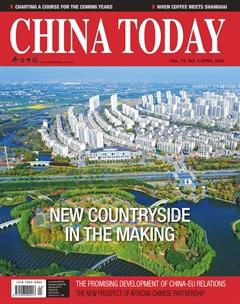Pursuing High-Quality Development and a Better Life
In early March, the annual sessions of the 13th National Peoples Congress (NPC) and the 13th National Committee of the Chinese Peoples Political Consultative Conference (CPPCC) convened in Beijing. NPC deputies deliberated on and adopted the Report on the Work of the Government and the Outline for the 14th Five-Year Plan (2021-2025) for Economic and Social Development and Long-Range Objectives through the Year 2035. The meetings provide the optimum time to unveil the political decision-making process in China, and showcase Chinas vows to modernize the country and further boost its economy and peoples livelihood in 2021 and beyond.
This year marks the beginning of the 14th Five-Year Plan, which begins the new journey of building China into a modern socialist country by 2035. It is the crucial year in which the Communist Party of China celebrates its centenary anniversary. The government work report set a target of six percent GDP growth for the year. The 14th Five-Year Plan differs from the previous Five-Year Plans, in that it doesnt give specific targets for GDP growth. Instead, it said that growth would be kept in a reasonable range and that an annual target would be set based on the specific conditions each year. Economic indicators that are closely relevant to GDP, such as the unemployment rate, energy consumption, and carbon emissions, were, however, specified, which implies that the economic growth rate should be consistent with the requirement of high-quality development.
For the first time, the Outline points out that over the next five years, the proportion of expenditure on basic research in total R&D investment will exceed eight percent, compared with 6.16 percent last year, which fell far short of inputs by developed countries. It shows that China is paying much more attention to basic research and innovation-driven development.
China pledged in the Outline that it will devote greater energy to pursuing common prosperity. It will create a livable environment, promote social harmony, make public services accessible to all, and realize peoples all-round development.
After eight years of continuous efforts, China has achieved a comprehensive victory in the fight against poverty. More than 100 million rural poor have been lifted out of poverty, which means that the poverty reduction goal set by the United Nations has been achieved in China 10 years ahead of schedule. After bidding farewell to poverty, rural residents in China, accounting for 40 percent of the nations total population, will embark on the path of modernization.
Due to the pandemic, China has been facing greater pressure in terms of employment since last year. In the government work report, China set a goal of providing 11 million new urban jobs this year, and containing the urban surveyed unemployment rate to within 5.5 percent. The employed population in China is mainly distributed in more than 30 million small, medium and micro enterprises and 90 million individually-owned businesses. These market entities often have weak anti-risk capabilities. To tide them over the pandemic, the government will allocate RMB 2.8 trillion of central fiscal funds directly to the city- and county-level governments. Preferential policies will be rolled out, including raising the value-added tax threshold for small-scale taxpayers from RMB 100,000 to RMB 150,000 in monthly sales.
During the 14th Five-Year Plan period, China will enter a moderate aging society, and the Outline has made dealing with this issue a national strategy. Measures to be taken include offering inclusive elderly care services, and building an elderly care service system in which seniors can be well taken care of at home or at community-level facilities and they have access to integrated services of day-to-day care and medical care. Public facilities will be renovated to accommodate the special needs of senior people.
Over the past five years, the quality of Chinas ecological environment has been significantly improved, but the industrial structure is still dominated by heavy chemical industries, the energy mix dominated by coal, and the transportation structure dominated by road freight. Green development indicators put forth in the latest government work report, such as “reaching a forest coverage rate of 24.1 percent of the countrys total land area,” and “lowing the energy consumption and carbon dioxide emissions per unit of GDP by 13.5 percent and 18 percent, respectively,” have received great attention. Green development calls for stricter environmental governance and regulation, optimization and upgrading of industrial structure, and high-quality economic growth.
There is a special chapter in the Outline on security development, which says that arrangements should be made to strengthen Chinas system and capacity for safeguarding national security in terms of food, energy resources, and finance.
China has a huge market with diverse demands. It still presents unparalleled opportunities for multinationals to participate in Chinas domestic circulation through their investments and business growth during the next five years and beyond.
- CHINA TODAY的其它文章
- “Two Sessions”Reaffirm China’s Commitment to Wider,Win-Win Opening-up
- Xi Jinping Speaks with Guyanese President Irfaan Ali on the Phone
- Basic Research’s Share in R&D Funding Grew
- Five Measures to Construct a Modern Rural Industrial System
- Chinese Artist’s Ink Paintings Exhibited in Chicago
- Dialogue,Win-Win Are Right Choices for China-U.S.Relations

